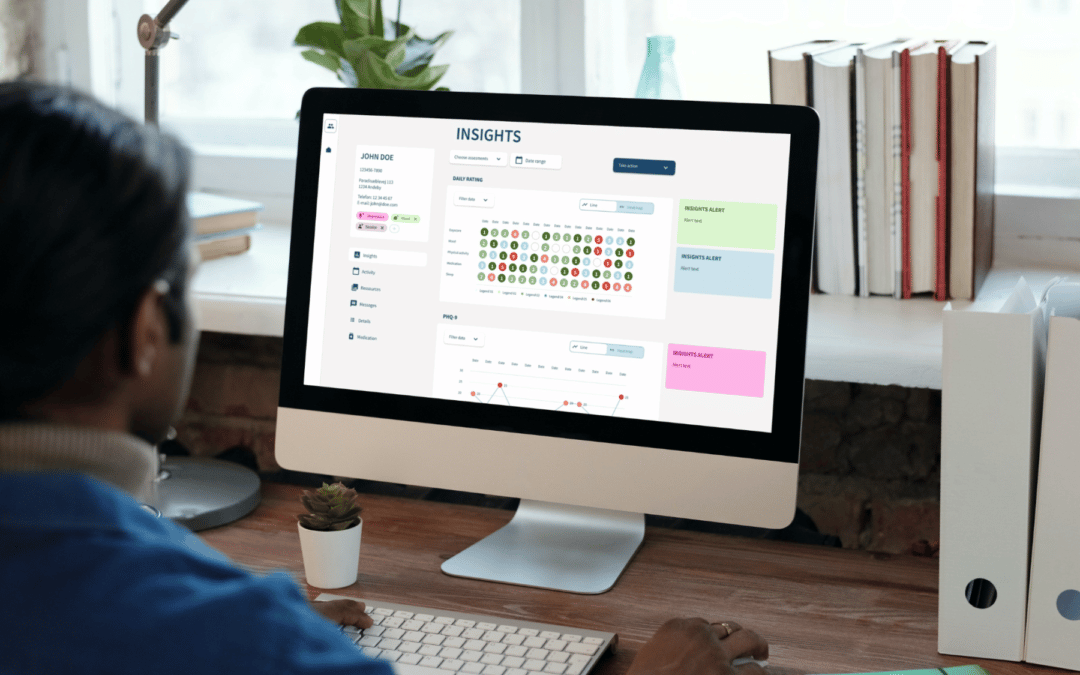Did you know that over 500.000 Danish citizens currently live with one or multiple mental health disorders [1] and that approximately half of the Danish population will suffer from a mental illness at least once in their lifetime [2]?
Mental health is declining in Denmark [2]. However, treatments and services offered to people with mental disorders often lack quality compared to those offered to people with physical disorders [2]. One of the reasons is a clear shortage of resources.
Lack of resources as a challenge in Danish mental health services
Recruiting and retaining mental health professionals, in social psychiatry, regional psychiatry, and specialised social services focusing on children and youths [2] has been a significant struggle in recent years.
In Region South, for example, only 8 out of 21 open job positions for psychologists could be filled at the beginning of the year. In Region Zealand, it was even less: 11 applicants for 22 advertised positions, and 6 suitable candidates hired [3].
There are several assumptions for why it is so challenging to recruit mental health professionals. One of them is that we are currently experiencing a generational shift, with many healthcare professionals retiring at the same time [3].
The insufficient capacity and availability led many individuals suffering from mental illness to not receive the right treatment at the right time [2]. The average waiting time to see a psychologist in Denmark is around 16 weeks – but in many cases, patients easily wait up to 20 weeks before their first treatment [4].
This limited capacity also reduces the possibility of early detection and interventions. Insufficient preventive measures are a major cause of high mortality rates amongst individuals suffering from severe mental illnesses in Denmark [2].
Approaches to improve mental health services in Denmark
In order to make the quality and availability of mental health services a top priority, the Danish government decided to initiate working on a 10-year plan for the development of psychiatry in 2020, setting aside 600 million Danish Kroner annually for the improvement of mental health care in Denmark. [2].
Recommendations for the long-term plan include the expansion of easily accessible offers for mental health services in Danish municipalities (including improved offers for children and young adolescents), increased country-wide mental health promotion, and better early detection of mental illness [2].
None of these goals will be properly implemented if Denmark is still facing a lack of resources. But while the need to hire more trained professionals is undoubtedly critical to improve mental health services, this may also be an opportunity for scalable technologies to improve the reach of the current workforce to serve the needs of patients waiting to receive care.
Digitalization as the key to improved mental health services?
A large study by Elsevier Health (2022) shows that 77% of international clinicians expect tech companies to become “key stakeholders in managing healthcare systems in 10 years”, and that the majority of clinicians (70%) believe an increased use of digital technologies will transform healthcare positively [5].
Many healthcare professionals therefore expect that digital technologies and remote monitoring tools could help them to handle the growing patient data volumes they are currently feeling overwhelmed with [5].
The current recommendations for the psychiatric 10-year plan acknowledge that digital solutions can facilitate making better use of resources available in the future, and ensure the capacity meets the growing demand for mental health services. The use of digital technology offers the potential to address challenges in Danish mental health services. In particular, the use of digital platforms for remote patient monitoring and health assessment could improve access and speed to care, and real-time patient analytics could enable personalised treatment and improved quality of care [5].
Everyone deserves access to mental healthcare. The integration of digital solutions in healthcare bears huge potential, and it needs to happen timely. There is never a better time to act.
——————————————————————————————————————————-
About Monsenso
Monsenso is an innovative technology company offering a digital health solution used for decentralised trials, remote patient monitoring and treatment support. Our mission is to contribute to improved health for more people at lower costs by supporting treatment digitally and leveraging patient-reported outcomes data. Our solution helps optimise the treatment and gives a detailed overview of an individual’s health through the collection of outcome, adherence, and behavioural data. It connects individuals, carers, and health care providers to enable personalised treatment, remote care, and early intervention. We collaborate with health and social care, pharmaceuticals, and leading researcher worldwide in our endeavours to deliver solutions that fit into the life of patients and health care professionals. To learn more visit www.monsenso.com.
References:
[1] EN AF OS (n.d.). About EN AF OS. Sundhedsstyrelsen.
http://www.en-af-os.dk/da/English/About-us#:~:text=Statistically%2C%201%20in%205%20Danes,they%20will%20get%20well%20again.
[2] Sundhedsstyrelsen (2022). Fagligt oplæg til en 10-årsplan.
https://www.sst.dk/da/Udgivelser/2022/Fagligt-oplaeg-til-en-10-aarsplan
[3] Kofoed (2022). Der er mangel på psykologer over hele landet – og det kan især gå ud over unge. DR.
https://www.dr.dk/nyheder/indland/der-er-mangel-paa-psykologer-over-hele-landet-og-det-kan-isaer-gaa-ud-over-unge
[4] Kofoed et al. (2022). Millioner til psykologhjælp forbliver ubrugte trods rekordlange ventetider. DR.
https://www.dr.dk/nyheder/politik/kommunalvalg/millioner-til-psykologhjaelp-forbliver-ubrugte-trods-rekordlange
[5] Elsevier Health (2022). Clinician of the Future Report 2022.
https://www.elsevier.com/connect/clinician-of-the-future

